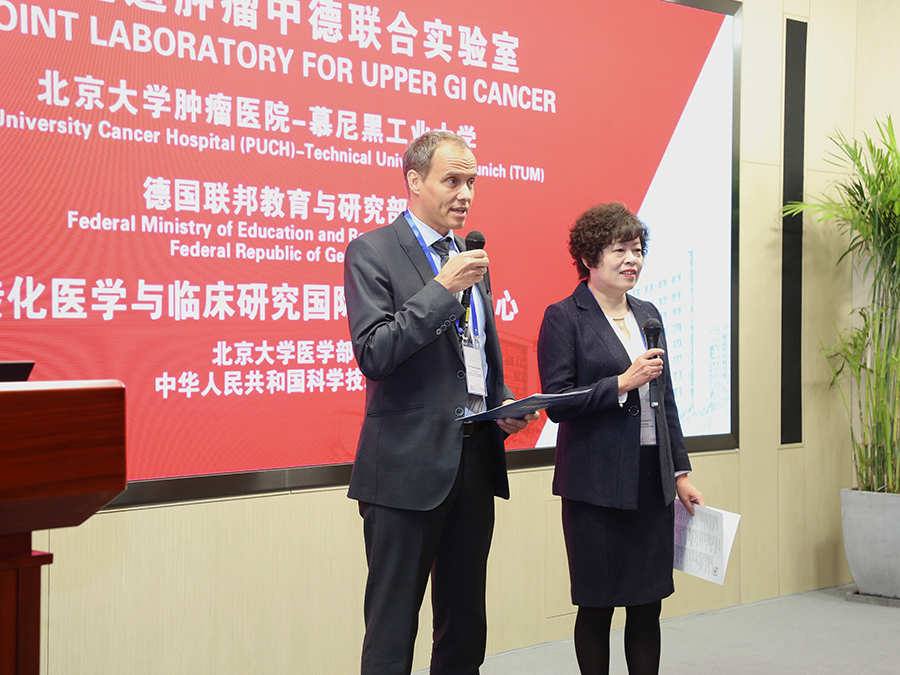PYLOTUM: New TUM overseas lab opens in Asia
TUM expands German-Chinese stomach cancer research partnership

Stomach cancer is the world’s third deadliest type of cancer. For over a decade, researchers from TUM and Peking University have been studying this disease in Linqu County in the north-east of China, where an unusually high number of stomach cancer cases has been identified. The researchers involved will soon be able to collaborate in an institutional setting at the new “Joint Key Laboratory (JKL) for carcinomas of the upper gastrointestinal tract” in China.
Targeting quicker diagnosis
One of the major risk factors associated with this type of cancer is infection with the bacterium Helicobacter pylori, which is found in the stomach. While over 50 percent of the world’s population is infected with the pathogen, only a fraction, however, will ever develop stomach cancer or its preliminary stages.
“We are detecting the cancer far too late. We need better diagnosis methods and biomarkers so that we can treat the infection before cancer has a chance to develop,” explains Prof. Markus Gerhard of the Institute for Medical Microbiology, Immunology and Hygiene at TUM. He and his colleague Prof. Pan Kai Feng from Peking University are in charge of the new “PYLOTUM” research project.
“The Technical University of Munich has the expertise, world-leading minds and the track record in stomach cancer to be the ideal partner for Peking University Health Science Center We believe that by working together, we can achieve more than we can alone, and we are certain this partnership will finally benefit the health of the people in both countries and hopefully around the world”, commented Prof. Zhan Qimin, President of the Peking University Health Science Center (PKUHSC) and Executive Vice President of Peking University.
Large-scale patient studies
The search for suitable markers calls for studies with large numbers of patients, hence the decision in favor of Linqu County. The first major research project is to be a ten-year clinical study with around 20,000 participants. It will involve endoscopic screening of subjects infected with Helicobacter pylori. The ultra-modern analytics lab has been designed to examine large volumes of medical material in a short space of time. Training and exchange programs will be organized so that the Chinese physicians in Linqu County can study and then apply the methods in line with best international practice. To establish a broad and comparative knowledge base, TUM is carrying out complementary studies in regions with different ethnic backgrounds.
The importance of China as a partner
The new research project at one of China’s top universities aligns with TUM’s internationalization strategy, which has forged a strong contact network in Asia through engagements such as its offshore campus TUM Asia in Singapore and a liaison office in Beijing. TUM is therefore acknowledging the growing international importance of China in the areas of science, medicine and innovation. Chinese students already represent the largest group of overseas students at TUM.
More information
The Federal Ministry of Education and Research (BMBF) is supporting the “PYLOTUM” research project at Peking University as part of the research funding program for the Asia-Pacific Research Area (APRA).
- Profile of Prof. Markus Gerhard
- Website of research group led by Prof. Markus Gerhard
- Article “Vaccine against Stomach Cancer“ about Prof. Gerhard´s research in the TUM magazine “Faszination Forschung”
Contact
Prof. Markus Gerhard
Institute of Medical Microbiology, Immunology and Hygiene
Technical University of Munich
Tel.: +49 (0)89 4140 – 2477
markus.gerhard@tum.de
Technical University of Munich
Corporate Communications Center
- Dr. Vera Siegler
- vera.siegler@tum.de
- presse@tum.de
- Teamwebsite